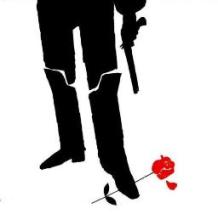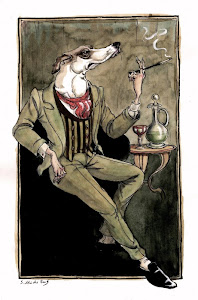 'It suffices to say that among all the old and long since fleshless heads my eye caught sight of two new ones hoisted high on poles--the heads of the Prince and of Braquemart. From the iron pike-heads with their curving hooks they looked down upon the glow of the fires which were flaking away to ash. The young Prince's hair had turned white, yet I found in his features greater nobility and the lofty, sublime beauty to which only sorrow gives birth.
'It suffices to say that among all the old and long since fleshless heads my eye caught sight of two new ones hoisted high on poles--the heads of the Prince and of Braquemart. From the iron pike-heads with their curving hooks they looked down upon the glow of the fires which were flaking away to ash. The young Prince's hair had turned white, yet I found in his features greater nobility and the lofty, sublime beauty to which only sorrow gives birth.At the sight I felt tears start to my eyes, but they were such tears as fill us with wonderful exultation together with their sorrow. On this pale mask from which the scalped flesh hung in ribbons and which looked on the fires from the elevation of the torturer's pike there played the shadow of a smile intensely sweet and joyful, and I knew that on this day the weaknesses had fallen from this noble man with each step of his martyrdom, like the rags of a king disguised in beggar's weeds. Then a shudder ran through my inmost heart, for I realized that he had been worthy of his forefathers, the tamers of monsters; he had slain the dragon fear in his own heart in his own breast. That I was certain of something which I had often doubted--there were still noble beings amongst us in whose hearts lived unshakeable knowledge of a lofty ordered life. And since a high example leads us in its train, I took an oath before this head that from that day forth I would rather fall with the free man than go in triumph among the slaves.'
Ernst Jünger, On the Marble Cliffs (1939)





















1 comment:
Love that book.
Can you believe it was required reading in an American school, albeit a private institution, of course.
Post a Comment